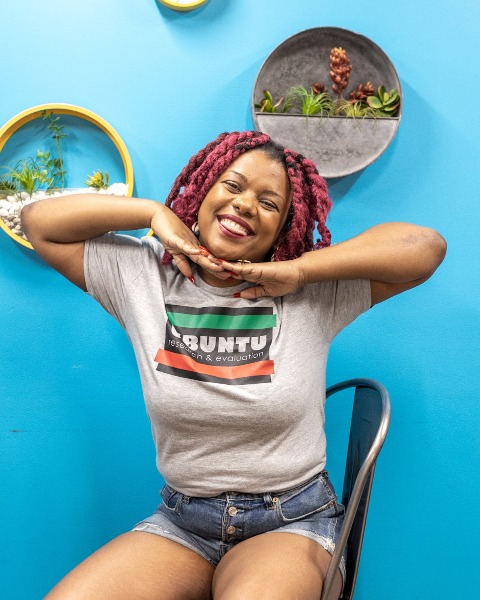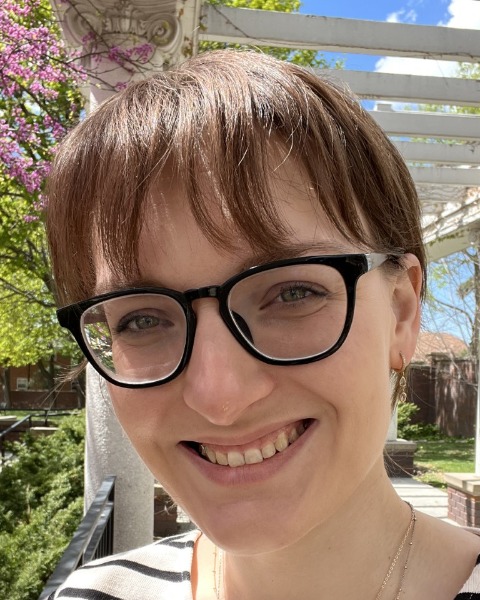Collaborative, Participatory & Empowerment Evaluation
Participa-Stories: Virtual tools for journey mapping and photovoice to engage youth and globally dispersed participants
-

Sojourner White, MSW (she/her/hers)
Director of Evaluation & Learning
UBUNTU Research & Evaluation, LLC
Milwaukee, Wisconsin, United States -

Shelby Andersen-Holt, MSW
Research Analyst II
Q-Q Research Consultants
OMAHA, Nebraska, United States
Presenter(s)
Location: Grand Ballroom 1
Abstract Information: Evaluators have long understood the need for participatory methods, both to engage participants in meaningful storytelling and to have engaging content to tell the story of the program. With the ongoing prevalence of virtual and asynchronous settings, evaluators need fresh tools for engaging diverse participants in virtual, participatory storytelling and for sharing these stories in dynamic ways. In this hands-on workshop, UBUNTU Research & Evaluation (UBUNTU) and Q-Q Research Consultants (QQRC) will introduce virtual tools for journey mapping and photovoice in diverse applications. UBUNTU will present tools used to facilitate youth storytelling through journey mapping in a youth participatory action research evaluation. QQRC will share practical applications of photovoice methodology using virtual tools to engage participants in time zones around the world. Attendees will gain hands-on experience with the tools in break-out groups and are encouraged to bring phones and laptops.
Relevance Statement: Traditional evaluation methodologies tend to dictate to participants what will happen instead of involving them in the co-creation of the evaluation as “co-researchers.” Data collection and reporting have also traditionally relied on written formats such as surveys and narrative reports, approaches that tend to be less engaging for youth and participants from different cultural and linguistic backgrounds. To engage and center lived experience experts in participatory evaluation approaches, evaluators have adapted and adopted tools that draw on storytelling techniques. Two such tools are journey mapping and photovoice. These participatory evaluation methodologies allow co-evaluators to explore richer, deeper narratives about a program’s work and effectiveness. In journey mapping, the evaluator captures and visualizes participants’ personal experiences throughout a program, allowing for a deeper understanding of program pain points and areas of opportunity (Prieto-Alvarez, Martinez-Maldonado & Buckingham Shum, 2018). Photovoice engages participants in a creative medium - photography. It addresses dynamics of power and control in evaluations. As outlined in the paper “Worth a Thousand Words? Advantages, Challenges and Opportunities in Working with Photovoice as a Qualitative Research Method with Youth and their Families” (Woodgate, Zurba, & Tennent): “Photovoice has been heralded as an unobtrusive way of entering the worlds of individuals, providing strategies for co-researchers to define the problem of interest, revealing what might be uncomfortable or unknown. By enabling the co-researcher to produce the images that are the focal point for discussion, the method creates the space for the co-researcher to build the context and provide the setting for research questions.” However, as much as evaluators may hope to engage stakeholders through participatory methods, some program contexts do not allow practitioners to use the tools of typical in-person engagement, like sticky pads on walls or handing out cameras. To support evaluators in translating these participatory approaches to virtual contexts, this workshop will introduce practical tools for virtual journey mapping and photovoice activities. Through illustrative examples from UBUNTU and QQRC as well as hands-on practice, participants will understand how to apply these strategies to enhance storytelling in their evaluations and uplift the experiences of participants as co-researchers. Workshop attendees will feel through the process of capturing stories using these tools how to set up each strategy for success. They will also reflect on the skills evaluators need to develop to enhance our participatory methodologies to demonstrate narrative change. We want to host this workshop to share practical tools and our lessons learned with a wide audience. This workshop contributes to the field in several ways: - Adding to the pertinent conversation about effective utilization of participatory methodologies that center the voices of participants through storytelling, - Introducing two participatory methodologies that center the stories of participants, journey mapping and photovoice, - Providing practical examples of virtual applications of journey mapping and photovoice with youth participatory action research programs and international education programs, and - Introducing tools for virtual journey mapping and photovoice through hands-on experience.
